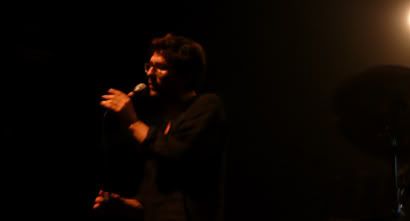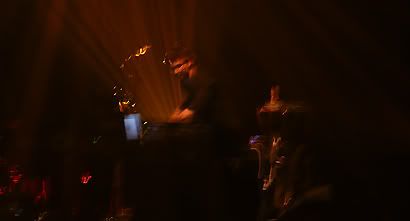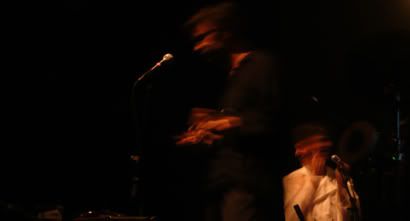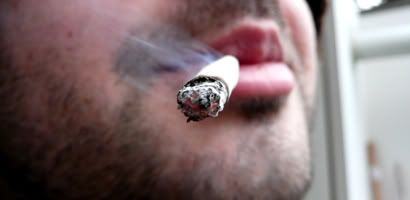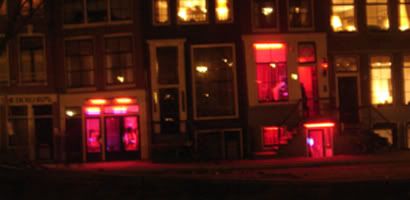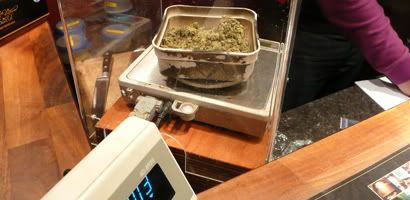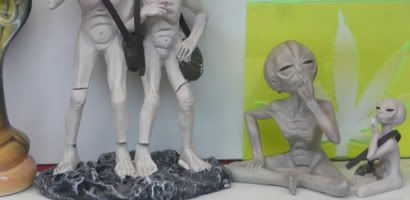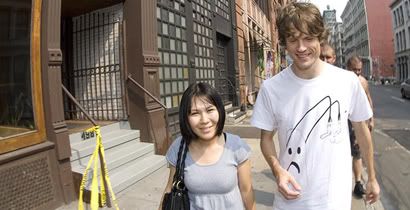
With downloading rampant, a proper indie band their money on the road, living from hotel room to mini-van to backstage, but generally wouldn't have it any other way. Deerhoof are that band. Constantly surprised by the amount of Deerhoof fans around the globe, drummer Greg Saunier talks to Subbacultcha about playing in communist countries, bootlegged t-shirts and a peppercorn banned in all 50 states of the US.
Deerhoof seem to be on the road a lot. Is being in a band your reason for traveling or is traveling your reason for being in a band?
I never had the travel bug personally. I know Satomi always has. But either way traveling in a band is not really the same thing as traveling for pleasure. We don't usually have time for sightseeing etc. The part of a city that we always see is the inside of some rock club, and actually these places are not especially different from one another across the globe. But then again we have an excuse to meet people that the average sightseer doesn't have. People come to our concert and they like to talk to us. So in a way our travel experience is much richer.
What is always in your carry-on luggage?
We always try to carry on guitars but we get dirty looks from the attendants a lot. They aren't really carry-on size.
What's the band's favoured mode of transport; mini-van, tour bus, Hitchhiking, personalised Jet, Trans Am?
Well, there is our favoured mode and then there is our usual mode. Favoured mode would be either train, or maybe driving, but taking all side roads and small roads. The rare times we can do this are such beautiful scenic experiences. We are able to take the train some in Japan. And driving from Poland one time we had no choice because the only road was a small road. It was snowing and the countryside and little towns we passed through were stunning.
But usually we are in a rented minivan, and we need to take the main motorways in order to arrive on time.
You recently played Strawberry Festival in China and you found a girl advertising "Bootleg Deerhoof T-shirts" Did you introduce yourselves?
Of course. She was very nice actually. She was a big fan of the band so that was quite a surprise - We didn't know if anyone knew our music there. At the same time, she didn't actually apologize for the shirts. But she did give us some. One design was of "Milk Man", one of our albums, so we got one of those for the original artist who made that image - We knew he would think it was funny,
At the festival you said the Chinese audience seemed new to rock music and they had not yet found their niche as fans - was such naïve openness refreshing?
I think actually it would be condescending to put it that way. I'm not sure that there is any advantage to finding one's niche. That just means that there is more that you don't like. More potential for unhappiness, don't you think? Maybe us over-specialized over-hip subgenre defenders are actually the naive ones.
Tell me about how Chinese food is different to 'Chinese Food' in America?
In the US, Chinese food I've had all tastes pretty similar. Like, if each person in the band orders a different item from the menu, we could still get away with combining them all together. You'd hardly notice. Because basically you either get the "brown sauce" or the "white sauce". For all I know those sauces exist in some region of the enormous of China. But I didn't find anything like that in Beijing. We were treated to a lot of dishes and there is no way you would combine any of them, they tasted so utterly different from each other. And wow, some seriously spicy food. There was this particular peppercorn that apparently has been banned from being imported into the US until recently. I don't remember ever having anything like it. It sort of makes your tongue feel like it is disintegrating.
See full report...
Will you eat anything on tour? Are you confident to immerse yourself and eat what the locals eat?
Well we're impossible because we've got one vegan, two vegetarians and one omnivore. But I always love coming to Europe. (I am writing to you from France). Here, the venue feeds you at every show. Here in France we are treated to the most amazing multi-course meals. All the staff and bands eat all together and everyone says "Bon appetit". We even set up tours to Italy just so we can eat the food. We don't actually have any fans there.
You also just played Moscow and St Petersburg. You mention on your blog you wanted to go via the Trans Siberian Railway, will you return to that some time?
Oh, that would be an adventure. Trouble was it only left twice a week from St Petersburg to Beijing, and the trip was a week long. It didn't leave on the right day for us to be able to make it.
What surprised you about Russia?
That it was real. I always feel that way going to new place that I've always heard about.
How were the crowds there - any different from a normal Deerhoof crowd?
No such thing as a normal Deerhoof crowd! In Russia I would say that people had an emotionless exterior on the train or walking down the street, but man, once the concert was happening they were about as demonstrative as you could imagine. And for every band, all kinds of music, no matter how strange. Lots of interpretive dancing, shouting, smiles.
Do you find it odd to visit these countries that, while growing up in America you had so ingrained into you were bad or Anti-American, poor or dangerous and yet be so welcomed as an American rock n roll band?
Well growing up in America you're brought up to think that EVERY country is anti-American, or at least inferior. I don't find it odd to travel the world, I find it beautiful to have my preconceptions destroyed over and over. It is possible for people to live and organize themselves in all kinds of ways that the American media doesn't want you to know about. In some countries they actually don't want any impoverished class. Or they give themselves health care. Or they don't allow themselves to carry guns.
The fact that we are welcomed is of course a shock, partly because I never expect anyone so far away to know anything about our obscure band. I'm so thankful for the welcome that we get. But I can never figure out if it's a sign of some great universality of our music or just the Americanization of the entire globe.
What does 'home' mean to you?
I was going to say hotel room but actually the place that feels like home to me the most is the stage.
Can you record on the road or get much time to write?
I suppose you could record while touring but we usually take our time and record ourselves, so it's not practical to do that during the rushing around of touring. As for writing, I would guess that every member of the band would give you a different answer. We all write our music in totally different ways. Like John writes on guitar a lot and I hear him noodling around backstage all the time so he might be writing. For me, I often feel like my songs write me rather than the other way around. Ideas just come to me, and they can come whether I'm on tour or not. I just keep my pencil and paper within reach. I have to say though that I don't tend to get as many good ideas on tour. I think it is because the music floating around in my head is just a lot of Deerhoof songs that we are playing every day. They sort of cancel out something new.
I just bought my ticket for Blur in Hyde Park, July 3, and you guys are supporting. Are you guys big Blur fans?
This concert will be my introduction to their music.
Have you played to such a massive crowd as this one will be, and is it daunting knowing they're there for Blur?
Not at all, we love playing to audiences who don't know us. It's a great challenge but kind of free in a way, because no one has any expectations of you. It's when we play a small room of people who really like Deerhoof, now that is really daunting!
Have you got any Paulo Ceolho-styled or Paul Theroux travel inspired words of wisdom?
Who's that?

